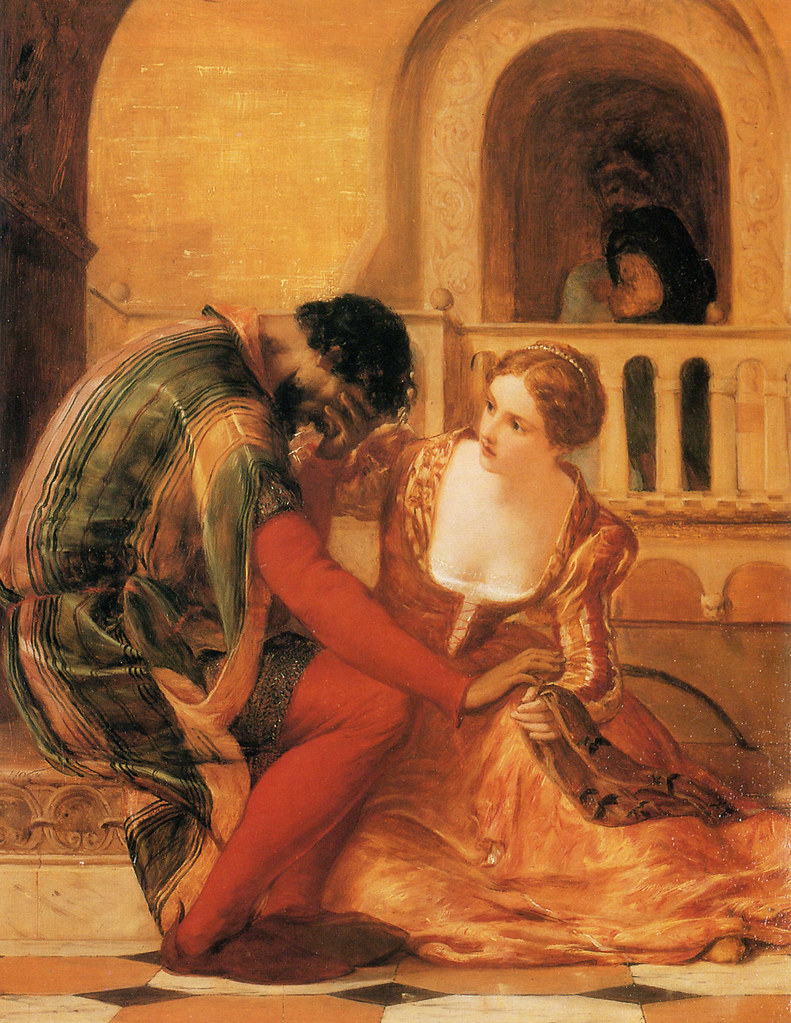Othello’s love for Desdemona can easily be recognised as the most important factor in the play’s tragic progression, and is the centre around which all of the plays characters orbit.
With this in mind, understanding the exact nature of their relationship is crucial in understanding the play as a whole. The strength of Othello’s feelings is made clear very early in the play, during his confrontation with Desdemona’s father; “She loved me for the dangers I had passed, and I loved her that she did pity them” demonstrates not only that their love was born out of a mutual understanding for each other, but implies that Othello finds something in Desdemona that he is unable to find anywhere else. Her admiration of his past and acceptance of his identity stands out among the Venetian officials who treat Othello with suspicion and mistrust, and the intimacy that Othello claims to have with Desdemona is not shared with any other characters.
However, while the authenticity of Othello’s feelings cannot be questioned, the ways in which these feelings manifest themselves are less than ideal. There is ample evidence in the play to suggest that Othello sees Desdemona as an object to be possessed, another “spoil of war” who has no autonomy of her own, seen primarily in the way that the actions of the play unfold entirely without input from Desdemona herself, despite her supposed unfaithfulness being the motivating force of the play’s conflict.
While it is first and foremost an element of Shakespeare’s tragic storytelling, (being in this case unawareness, blindness, helplessness etc.), Desdemona’s voicelessness regarding conflicts that directly involve her is typical of an archetypal female object of desire. It could even be said that Desdemona’s importance to the play’s story relies on her voicelessness and her inability to act. Furthermore, it could easily be argued throughout Othello, Shakespeare presents love itself as something to be possessed, which is given to one person at the expense of another. This is represented primarily by Desdemona’s handkerchief, given to her as a symbol of Othello’s complete devotion, which upon being misplaced, leads Othello to believe that Desdemona has given her love away to Cassio, meaning that it no longer belongs to him. The use of the handkerchief is important as it illustrates the way in which Othello views love as something which is to be owned and protected, like a sacred object, and while this defensiveness isn’t uncommon in many romances, Othello’s love of Desdemona is presented as being intensely possessive.

The love present in Othello is not free or empowering, but is one of insecurity, ownership, and defensiveness.
The abundant love that Othello feels for Desdemona finds its foil in his crippling lack of certainty, transforming something pure and compassionate into a catalyst for destruction and chaos. The potency of Othello’s love is not diminished by its harmful expression, but is actually the prerequisite for the obsession that Drives Othello to madness. Ironically, Othello finds himself possessed by his own love for Desdemona, and is eventually destroyed by it.
With many thanks to BF – year 13 2022

Despite Othellos love being without boundary, its could be said to be limited in nature, as he allows her access to the battlefields. Blurring the line between his family and career.
LikeLiked by 1 person
Blurred lines are a feature of tragedy; such as is the blurred line between victim and villain
LikeLike
It could be argued that the authenticity of Othello’s love for Desdemona could indeed be questioned, shown when he speaks of how she cared for his stories of war and treachery, and he loved that she cared- does he truly love Desdemona, or does he love that she loves him?
LikeLiked by 1 person
A wonderful point of debate for A05!
LikeLike
It could also be argued that Desdemona herself views Othello as a prize of sorts, she is enamoured by his tales and skills and finds herself entirely unprepared to cope with his jealousy and insecurity. This, I believe, is because throughout the beginning of their relationship she looked at him ‘through rose coloured glasses’, he was a well respected general who her father – a man that until her marriage had her complete loyalty (“I may profess due to the Moor my lord”) – greatly admired initially. On the other hand, Othello may view Desdemona similarly as an idealised version of herself raising her to standards impossible to meet by confining her to purity and perfection. As a result, the conflict between the two is sourced from their similarities rather than their differences, both lack power in society (though for different reasons) and appear to view the other as an idol, someone through whom they can receive power and respect. As two halves of the same coin they rely on one another almost entirely and view each other as a prize/something to be possessed and to benefit from.
LikeLiked by 1 person
While I agree that Othello’s love for Desdemona is authentic, he finds himself feeling insecure and unsure of her love for him due to Iago’s meddling. This could show he preferred the feeling of being loved, rather than loving her.
LikeLiked by 1 person
I agree that the handkerchief symbolises how Othello views love in a possessive nature. When Desdemona loses the handkerchief, Othello begins to lose the love he has for Desdemona, as the handkerchief was almost the connection between them both.
LikeLike